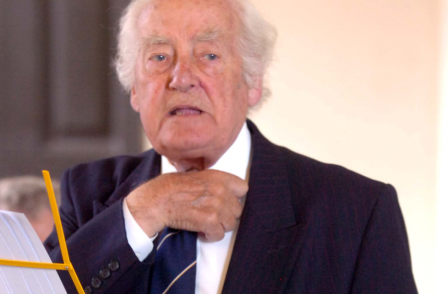
Newspaper legend Sir Ray Tindle last night predicted local newspapers will bounce back from this latest recession.
Speaking at a Media Society debate on the subject "is local journalism dead?" – Tindle said: “Golden years have followed each of the five recessions.”
He said: “Revenues have been down over the past five years but those declines have flattened and in some places are actually going up. We are coming back after this sixth recession. “
Tindle said he bought a newspaper in west Wales 35 years ago from the receivers after seeing a notice in the Daily Telegraph.
“The first thing I did was say we were going to change the title to the Tenby Observer and we were going to concentrate just on Tenby.
“If a cat went missing, I wanted it in the paper. Above the fold on the first edition we had a story about two clothes brushes stolen from a local garage.
“We have had on average £100,000 per year profit from that paper over the past 35 years. Revenues this year are up 22 percent on last year. Circulation when I bought the paper was 3,500 – it is now 7,235.”
Local World chief executive Steve Auckland (who made no mention of the news which broke today that he is stepping down) said local journalism had the ability to engage with their communities in a way that the likes of Facebook, Twitter and other social media sites could not.
He used the example of a recent demonstration outside Parliament when the local paper in Derby launched a campaign against a plan to build tube trains in Germany instead of locally.
“The Derby Telegraph got 20,000 people to protest outside Parliament. It would be impossible to do that without the support of the paper.
“Remember the campaign the Liverpool Echo has run on Justice for the 96.”
Auckland described Local World as a “content and commerce organisation” and said it has an editorial staff of 980 people.
“We have a daily emphasis on what is happening in the local area whether it is going in online or in print. We want people working in the local community. You can’t have regional subbing hubs as you need to know what is happening and who people are and being part of the local community.”
He said that content is the most important thing in any publication, whether online or print.
“You can have lovely templates but if the content inside is crap then no one is going to read it.”
He said a great challenge for all media organisations was the method they were going to use to make money from mobile.
“Online, some 50 percent of our traffic is from mobile devices.”
He said that social media used properly is a friend to quality journalism and that when people search for things on the internet at least half of those searches are for local information.
“Mobile advertising revenue is weak. But a paywall is not something we would consider at this stage. You don’t want to kill the audience."
Johnston Press chief executive Ashley Highfield told the meeting: “We have debt but we are paying it down. We are looking to refinance and profits are going up. We are continuing to invest in print and online. We have re-launched 200 newspaper and websites.”
Addressing the future of print, Highfield said: “The question is going to be when the tipping point between the decline in print revenue is more than offset by increases in digital. I thought that would be in 2016, now I think it is nearer.
“Digital is now between 15-20 percent of the total ad revenue. That has increased by 25-30 percent over the past 18 months.”
When asked about the cuts implemented by Johnston Press hitting the quality of its products, Highfield replied: “It is untrue that cuts have affected journalism in print or online. We are giving the readers what they want.
“We have to stop looking at just print circulation. Overall our audiences are going up. Digital growth more than outweighs print decline.
“But readers now want more involvement.”
Highfield said the challenge was to provide support for local businesses.
He said Johnston Press was the only regional publisher reselling Google ads and helping local businesses with their Google Adwords campaigns.
“We are now building websites for businesses and providing digital marketing services for SMEs.”
The meeting also saw the launch of the second edition of What Do We Mean By Local, edited by John Mair and Richard Lance Keeble. The book is published by Abramis and costs £19.95.
.jpg)
Email pged@pressgazette.co.uk to point out mistakes, provide story tips or send in a letter for publication on our "Letters Page" blog
